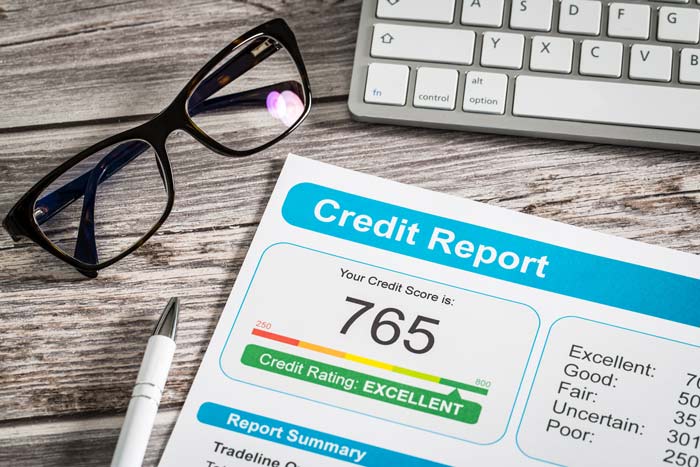Credit scores are like mythical creatures: We all have varying levels of knowledge on what they are and how they operate, but certainty on them is elusive.
It’s important to know that credit scores and the financial behavior determining them have very real consequences.
In 2023, the average FICO credit score was 718. That means the majority of Americans had good credit scores.
A “good” credit score is one of 670 or higher. Around 67% of Americans have credit scores that met that criterion.
The higher your credit score, the better. A high score helps when you borrow money for a home, a car or even apply for a credit card. That high credit score could lower interest rates and pave the way to a solid financial future.
This article will review what a good credit score is, why that good score is so important, and strategies to improve your score.
If you want to improve your financial future, start by improving your credit score. If you want to improve your credit score, start here.
Is a 700 Credit Score Good?
Any credit score that is at least 700 is good and indicative of an individual being financially responsible.
Your credit score is determined when credit agencies collect and maintain data from your credit history to form your credit report. These bureaus then apply a scoring model to that information to compute your score.
The Consumer Financial Protection Bureau identifies the major credit agencies as Equifax, TransUnion, and Experian. The data these agencies use to calculate scores varies, so your score can differ between them. The most commonly used formula is the model developed by FICO, which is used by 90% of lenders.
FICO says “good” credit scores as those falling between 670 and 739, so 700 is a good credit score. You can and should aim higher, though. FICO scores range from 300 to 850, with 850 being the best possible score.
FICO says scores above 800 are “exceptional” but only one in five consumers reach that level. Don’t worry if you can’t count yourself among those with an “exceptional” score. There are ways to improve your score, and you can still benefit from a score of 700.
What Can I Do With a 700 Credit Score?
Having a credit score above 700 qualifies you for many financial benefits. Like lower interest rates on loans or better credit card perks.
Here, we’ll review some of those opportunities presented by good credit scores.
Credit Cards
Scores in the 700s qualify you for credit cards with good cashback rates and other bonuses like airline miles or hotel points.
A good credit score also might lead to a card that offers a sign-up bonus, which could be cash applied to your balance or a lower credit card interest rate.
Pay attention to the required credit score before you apply for a card; the approval process can reduce your credit score and thus make you ineligible. More importantly, be sure to pay the cards on time; not doing so may hurt your credit score.
Mortgages
Good credit scores can help you qualify for a mortgage. Typically, the higher your credit score, the lower your interest rate on the mortgage. A 30-year mortgage interest rate reduced by one-quarter percent can save thousands over the life of the loan.
Different loans have different credit score thresholds. For example, a 580 credit score can qualify you for a Federal Housing Agency loan, but a credit score of 700 can qualify you for a jumbo loan of up to $1 million.
Loans
Higher credit scores mean access to better offers on personal loans, home loans, and even auto loans. The difference between good and very good credit scores can be the difference between a truly affordable loan and one that puts pressure on you every month.
Even with high car prices, those with credit scores ranging from 700 to 750 see 14.09% interest rates on new car loans, whereas those with credit scores in the 600s see 17.16% interest rates. For someone borrowing $25,000 on a 5-year loan, that’s a difference of $50 a month or $3,000 over the life of the loan.
How Can I Increase My Credit Score to 700?
There are a few ways to increase your credit score to that magic number:
- Pay your bills on time: Establishing a history of timely bill payments demonstrates trustworthiness. It is the No. 1 way to improve a credit score.
- Keep track of due dates: Do this by noting them in a calendar or enrolling in autopay. Late payments cause dramatic drops in credit scores.
- Check your credit report for errors: You can request your credit report from all three reporting agencies for free through AnnualCreditReport.com.
- Dispute any errors in your credit report: The Consumer Finance Protection Bureau offers resources on their site to manage the process.
- Maintain a low utilization rate: Your monthly credit balance should be 30% of your credit limit. Credit utilization, or the balance you put on your card, counts for 30% of your FICO score.
- Report your rent to credit bureaus: If you have a good history of paying your rent on time, use a rent-reporting service so major credit agencies include that history in your credit report.
- Become an authorized user: If you have a friend or relative with a history of good credit, adding your name to their account earns you good credit by extension.
Remember, if you already have a good credit score, the best approach is to keep doing the things that got you that score in the first place.
Want To Learn More About Credit Scores?
If you’re seeking additional information, or next steps if you have a low credit score, here are some strategies and information on building up your credit.
- If you need to do so quickly, these methods can increase your credit score by 100 points in one month.
- If you have no credit history, use the link to get acquainted with the process of building credit.
- If you still have questions or need a quick rundown, review these myths and facts about credit scores.
- Become familiar with the process to review your credit report.
Bad financial behavior can be costly, especially when interest rates are high. The good financial habits that go into good credit scores are important.
If your financial situation is challenging, you can seek help from a nonprofit credit counselor who can review your finances and suggest the best path forward.
Credit counselors work with credit card companies and other lenders to consolidate debt into one payment at a lower interest rate.
The counselors can also determine a good budget plan and provide financial advice. If you’re not in the 700 Club, following the suggestions listed above is a proven way to join.

6 MINUTE READ
Home » InCharge Blog »
Sources:
- Dickler, J. (2017, July 11). Credit card users rack up over $1 trillion in debt. Retrieved from http://www.cnbc.com/2017/07/11/credit-card-users-rack-up-over-1-trillion-in-debt.html
- (2017, July 12). Fed Chair Janet Yellen: US Economy is ‘Healthy Enough’ for Gradual Interest Rate Hikes. Retrieved from http://fortune.com/2017/07/12/federal-reserve-janet-yellen-rate-increases/
- NA, ND. US Average FICO Score Hits 700: A Milestone for Consumers. Retrieved from http://www.fico.com/en/blogs/risk-compliance/us-average-fico-score-hits-700-a-milestone-for-consumers/

















